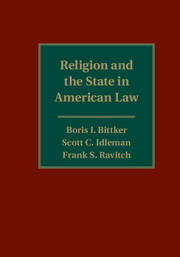Book contents
- Frontmatter
- Dedication
- Contents
- Preface
- 1 History and Introduction
- 2 Church and State in the Nineteenth Century
- 3 Religious Influences and Expressions in Law and Government
- 4 The Establishment Clause
- 5 The Free Exercise Clause
- 6 The Religious Test, Equal Protection, and Free Speech Clauses
- 7 The Definition of Religion
- 8 Church Property Disputes and Church Schisms
- 9 Contracts
- 10 Taxation
- 11 Employment
- 12 Land Use
- 13 Torts
- 14 Criminal Law and Process
- 15 Family Law
- 16 Public Education
- 17 Religious Symbolism on Government Property
- 18 Special Contexts: Prisons and the Military
- Appendix A Federal Constitutional Provisions
- Appendix B State Constitutional Provisions
- Appendix C Selected Federal Statutes 910
- Index
12 - Land Use
Published online by Cambridge University Press: 05 October 2015
- Frontmatter
- Dedication
- Contents
- Preface
- 1 History and Introduction
- 2 Church and State in the Nineteenth Century
- 3 Religious Influences and Expressions in Law and Government
- 4 The Establishment Clause
- 5 The Free Exercise Clause
- 6 The Religious Test, Equal Protection, and Free Speech Clauses
- 7 The Definition of Religion
- 8 Church Property Disputes and Church Schisms
- 9 Contracts
- 10 Taxation
- 11 Employment
- 12 Land Use
- 13 Torts
- 14 Criminal Law and Process
- 15 Family Law
- 16 Public Education
- 17 Religious Symbolism on Government Property
- 18 Special Contexts: Prisons and the Military
- Appendix A Federal Constitutional Provisions
- Appendix B State Constitutional Provisions
- Appendix C Selected Federal Statutes 910
- Index
Summary
This chapter addresses the variety of laws that affect real property used by religious organizations (and to a lesser degree individuals) for religious purposes. It starts with the most obvious form of land use control: zoning. After a brief description of earlier jurisprudential trends, attention turns to federal law: the Religious Land Use and Institutionalized Persons Act of 2000 (RLUIPA), which governs the regulatory relationship between local governments and religious organizations. The chapter then moves from a consideration of zoning and RLUIPA to a host of other topics relevant to individuals and groups as they use their property for religious purposes: the law of nuisance and private restrictive covenants; laws relating to charity, sanctuary, and surveillance; laws against desecration of religious sites and disruption of religious services; historic preservation; and eminent domain. Note the special regard often given the house of worship as courts, legislatures, and agencies attempt to protect this preeminent locus of religious activity and symbol of religious pluralism while at the same time balancing other significant social, aesthetic, and economic considerations.
Zoning Religious Land Use: Twentieth-Century State and Federal Developments
1. Land Use Controls on Religious Properties
Religious exercise, even when focused on matters transcendent, occurs here and now in a physical space. Thus it is not surprising that religious groups worship and conduct nearly all their ancillary activities – education, pastoral work, service to society – on real property and usually on real property that they own; alternatively, they rent space or meet in private homes. Access to land and buildings is quite clearly a precondition to religious assembly and religious exercise. As one federal judge commented,
[p]laces of worship have in almost all religions been as integral to their religion as have Sunday School, preaching, hymn singing, prayer, and other forms of worship which we have traditionally recognized as the “exercise” of religion. Churches are the situs for the most sacred, traditional exercise of religion: baptisms, confirmations, marriages, funerals, sacramental services, ordinations, and rites of passage of all kinds.
[T]he place of worship is central to the first amendment concept of free exercise as essentially the only place of religious “assembly” and the central place for the expression of religious “speech.” Thus, when government agencies seek to encumber the use of buildings for religious worship, they are, in fact, impinging on speech, assembly, and religious exercise through the use of zoning ordinances.
- Type
- Chapter
- Information
- Religion and the State in American Law , pp. 504 - 571Publisher: Cambridge University PressPrint publication year: 2015



